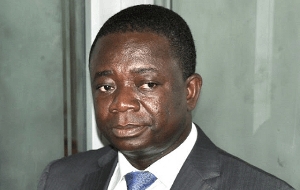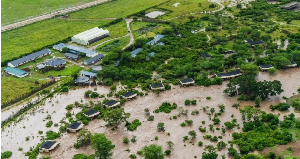- Home - News
- TWI News | TV
- Polls
- Year In Review
- News Archive
- Crime & Punishment
- Politics
- Regional
- Editorial
- Health
- Ghanaians Abroad
- Tabloid
- Africa
- Religion
- Election 2020
- Coronavirus
- News Videos | TV
- Photo Archives
- News Headlines
- Press Release
General News of Saturday, 4 January 2003
Source: GNA
Yendi crisis a potential threat to national stability
The potential threat of the Yendi crisis to national integration was a major concern at the 54th annual New Year School, which ended at Legon in Accra at the weekend.
Participants at the five-day school organised by the Institute of Adult Education of the University of Ghana expressed concern at the stalemate between the feuding parties and called for dialogue to prevent the crisis from degenerating into the major conflict being experienced by neighbouring Cote d' Ivoire.
Dr. Mohammed Ibn Chambas, Executive Secretary of the Economic Community of West Africa and Dr. Paa Kwesi Nduom, Minister for Economic Planning and Co-operation were among the personalities who drew the attention to the threat the crisis posed to national stability at the School, which was on the theme: "peace, stability and national development".
Dr. Chambas, who could not address the school in person due to official assignment at Cote d'Ivoire told the 179 participants of the human and material cost conflicts were causing to the sub-region, hence the need for Ghanaians to nurture national integration.
Dr Nduom urged the citizenry to make Ghana the pathfinder of peace in the sub-region by promoting the rule of law and democracy.
He said Ghana was at the verge of signing a credit/debit agreement with Cote d'Ivoire to improve on trade within the two countries when the neighbouring state was engulfed in conflict.
"The conflict has hurt us all," he said.
Mr. Hussein Sulemana, Upper East Regional Director of the National Commission for Civic Education (NCCE), a participant at the school called for a comprehensive programme to educate civil society on the dangers of conflicts. Of most concern, he said, was the strengthening of the capacity of the youth to appreciate the need for national stability since they were usually at the forefront of conflicts.
Mr Issah Abdulai Nasagri, Northern Regional Director of the NCCE said dialogue was the only way to end the Yendi crisis.
"This has been the time-tested method of resolving conflicts all over the world. We may delay dialogue in Yendi but we shall eventually come to it."
Mr Isaac Osei, Programme Co-ordinator of Peace and Reconciliation of Action aid Ghana, a non-governmental organisation (NGO) said the Inter-NGO Consortium in the Northern Region, in collaboration with the West Africa Network for Peace Building was putting up measures to build the mechanisms for peace in Dagbon.
He said since government had issued a White Paper on the Yendi crisis, it was left with stakeholders of the peace process to meet and strategise.
Mr Osei said Action Aid last year spent 140 million cedis to train a number heads and teachers of second cycle schools in the region on peer mediation on peace building.
He said the programme beneficiaries were expected to train students to come out with messages to consolidate peace in Dagbon.
Mr Osei announced plans to introduce the training package to the Upper East and Upper West Regions.










